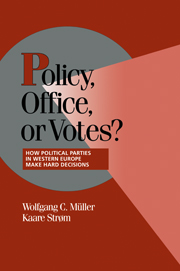Book contents
- Frontmatter
- Contents
- Figures
- Tables
- Contributors
- Chapter 1 Political Parties and Hard Choices
- Chapter 2 Office, Votes, and Then Policy: Hard Choices for Political Parties in the Republic of Ireland, 1981–1992
- Chapter 3 Party Behaviour and the Formation of Minority Coalition Governments: Danish Experiences from the 1970s and 1980s
- Chapter 4 From Policy-Seeking to Office-Seeking: The Metamorphosis of the Spanish Socialist Workers Party
- Chapter 5 Changing Strategies: The Dilemma of the Dutch Labour Party
- Chapter 6 Party Behavior in a Polarized System: The Italian Communist Party and the Historic Compromise
- Chapter 7 Decision for Opposition: The Austrian Socialist Party's Abandonment of Government Participation in 1966
- Chapter 8 Leadership Accountability and Bargaining Failure in Norway: The Presthus Debacle
- Chapter 9 Winner Takes All: The FDP in 1982–1983: Maximizing Votes, Office, and Policy?
- Chapter 10 Trade-offs in Swedish Constitutional Design: The Monarchy under Challenge
- Chapter 11 Parliamentary Rules and Party Behavior during Minority Government in France
- Chapter 12 Conclusions: Party Behavior and Representative Democracy
- Index
- Titles in the series
Chapter 6 - Party Behavior in a Polarized System: The Italian Communist Party and the Historic Compromise
Published online by Cambridge University Press: 05 May 2010
- Frontmatter
- Contents
- Figures
- Tables
- Contributors
- Chapter 1 Political Parties and Hard Choices
- Chapter 2 Office, Votes, and Then Policy: Hard Choices for Political Parties in the Republic of Ireland, 1981–1992
- Chapter 3 Party Behaviour and the Formation of Minority Coalition Governments: Danish Experiences from the 1970s and 1980s
- Chapter 4 From Policy-Seeking to Office-Seeking: The Metamorphosis of the Spanish Socialist Workers Party
- Chapter 5 Changing Strategies: The Dilemma of the Dutch Labour Party
- Chapter 6 Party Behavior in a Polarized System: The Italian Communist Party and the Historic Compromise
- Chapter 7 Decision for Opposition: The Austrian Socialist Party's Abandonment of Government Participation in 1966
- Chapter 8 Leadership Accountability and Bargaining Failure in Norway: The Presthus Debacle
- Chapter 9 Winner Takes All: The FDP in 1982–1983: Maximizing Votes, Office, and Policy?
- Chapter 10 Trade-offs in Swedish Constitutional Design: The Monarchy under Challenge
- Chapter 11 Parliamentary Rules and Party Behavior during Minority Government in France
- Chapter 12 Conclusions: Party Behavior and Representative Democracy
- Index
- Titles in the series
Summary
INTRODUCTION
On August 11, 1976, the Italian Communist Party (PCI) decided to abstain in the vote of confidence for the third Andreotti cabinet – a monocolore (single-party cabinet) of the Christian Democracy (DC) – thereby making possible the formation of the first government with Communist support since May 1947. This event took place a few weeks after the parliamentary elections (June 20), in which the party had gained a very significant electoral success (Table 6.1). In July 1977, after weeks of negotiations, the PCI signed an agreement for a “common policy program” with the DC, the Socialist Party (PSI), the Social Democratic Party (PSDI), the Republican Party (PRI), and the Liberal Party (PLI). In March 1978, the fourth Andreotti cabinet marked the official participation of the PCI in the parliamentary majority supporting the cabinet – again, a DC monocolore – along with DC, PSI, PSDI, and PRI. In January 1979 the PCI withdrew its support from Andreotti, forcing the cabinet to resign. A tripartite cabinet (DC-PRI-PSDI) – Andreotti's fifth – was formed with the PCI in opposition. The PCI has never again been in office.
This is, in brief, the history of the so-called governments of national solidarity. What makes this an interesting case of trade-offs between party goals is that the PCI until 1976 had constantly reaped the electoral benefits of being in opposition; yet, as it shifted from opposition to office, it immediately lost votes and continued to lose them until 1994 (Figure 6.1).
- Type
- Chapter
- Information
- Policy, Office, or Votes?How Political Parties in Western Europe Make Hard Decisions, pp. 141 - 171Publisher: Cambridge University PressPrint publication year: 1999
- 16
- Cited by



